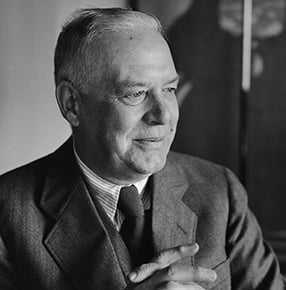Peter Quince at the Clavier
I
Just as my fingers on these keys
Make music, so the self-same sounds
On my spirit make a music, too.
Music is feeling, then, not sound;
And thus it is that what I feel,
Here in this room, desiring you,
Thinking of your blue-shadowed silk,
Is music. It is like the strain
Waked in the elders by Susanna;
Of a green evening, clear and warm,
She bathed in her still garden, while
The red-eyed elders, watching, felt
The basses of their beings throb
In witching chords, and their thin blood
Pulse pizzicati of Hosanna.
II
In the green water, clear and warm,
Susanna lay.
She searched
The touch of springs,
And found
Concealed imaginings.
She sighed,
For so much melody.
Upon the bank, she stood
In the cool
Of spent emotions.
She felt, among the leaves,
The dew
Of old devotions.
She walked upon the grass,
Still quavering.
The winds were like her maids,
On timid feet,
Fetching her woven scarves,
Yet wavering.
A breath upon her hand
Muted the night.
She turned—
A cymbal crashed,
And roaring horns.
III
Soon, with a noise like tambourines,
Came her attendant Byzantines.
They wondered why Susanna cried
Against the elders by her side;
And as they whispered, the refrain
Was like a willow swept by rain.
Anon, their lamps’ uplifted flame
Revealed Susanna and her shame.
And then, the simpering Byzantines
Fled, with a noise like tambourines.
IV
Beauty is momentary in the mind—
The fitful tracing of a portal;
But in the flesh it is immortal.
The body dies; the body’s beauty lives.
So evenings die, in their green going,
A wave, interminably flowing.
So gardens die, their meek breath scenting
The cowl of winter, done repenting.
So maidens die, to the auroral
Celebration of a maiden’s choral.
Susanna’s music touched the bawdy strings
Of those white elders; but, escaping,
Left only Death’s ironic scraping.
Now, in its immortality, it plays
On the clear viol of her memory,
And makes a constant sacrament of praise.
This poem is in the public domain. Published in Poem-a-Day on August 18, 2024, by the Academy of American Poets.
“Peter Quince at the Clavier” appears in Wallace Stevens’s debut poetry collection, Harmonium (Alfred A. Knopf, 1923). In December 1949, Poetry: A Magazine in Verse published “The Poetry of Wallace Stevens,” an opinion essay by J. V. Cunningham. The critic declared, “[Stevens’s] poetry is modern in that it is different from the old, the traditional, the expected; it is new. […] [Stevens’s] first and best book, Harmonium, appeared in 1923 when the author was about forty-four […]. He is a legendary figure in the world of letters, a living myth from an earlier age, a man of seventy. He is in this like his peers, Frost who is about seventy-four, William Carlos Williams about sixty-six, Pound sixty-four, Marianne Moore sixty-two, Eliot and Ransom sixty-one. Yet the attitude of modernity still persists. These poets still represent to the young writer of today the new, the adventurous, the advance-guard, the untried. Their names are still sacred to the initiate.”

